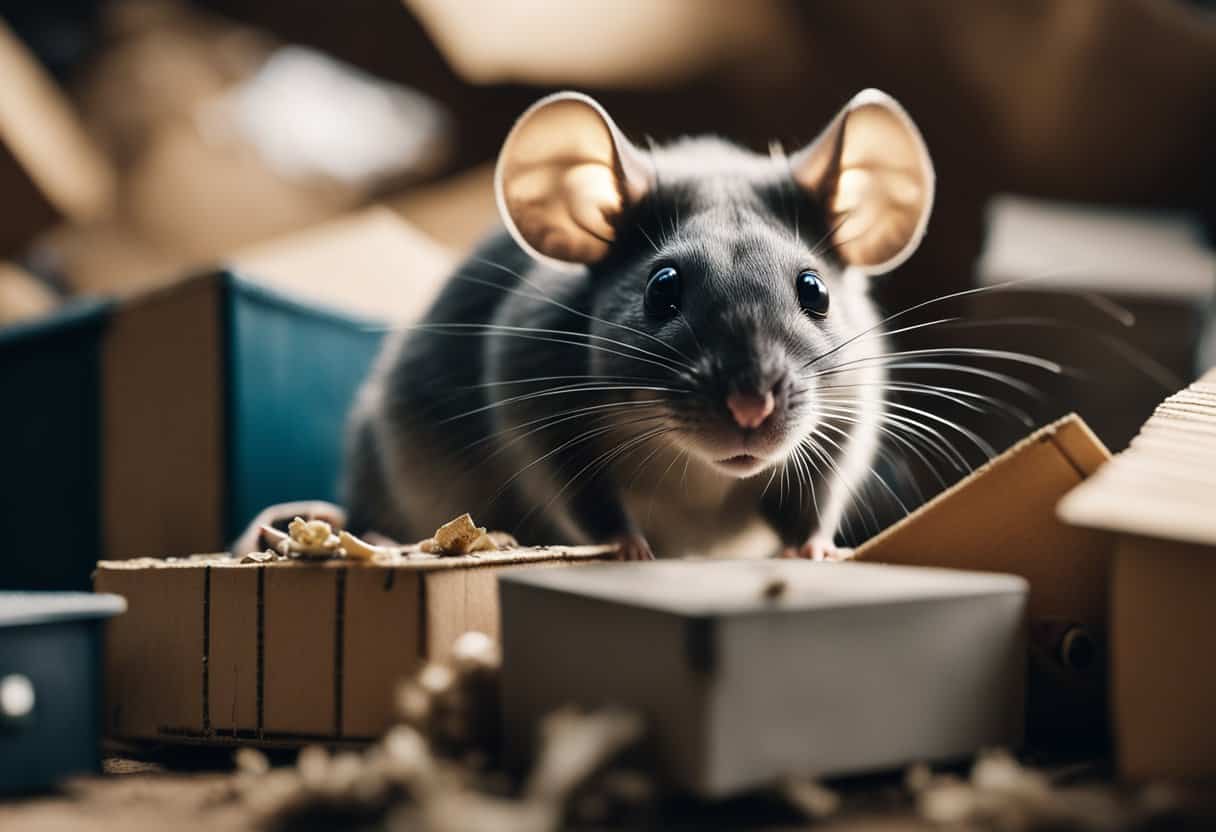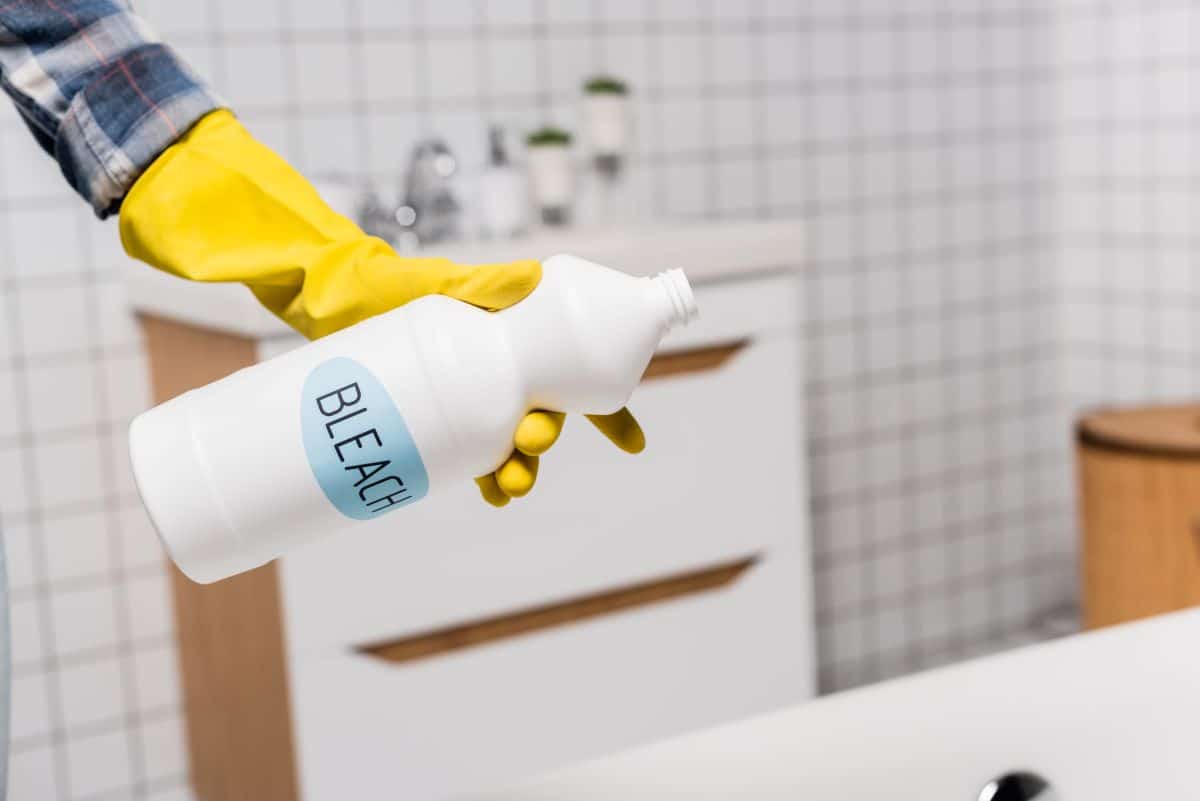Imagine a world without the maddening squeaks and scurrying at odd hours of the night – yes, a world without rodent infestations.
The question posed to us today might seem like an easy way out of this perennial problem; can bleach kill mice?
Yes, bleach can be effective in killing mice. When sprayed directly on mice or their droppings, the strong chemicals in bleach can be lethal to them.
However, caution should be exercised as this method poses risks to human health and is not considered a humane approach.
We recommend considering more effective and humane methods of rodent control such as sealing entry points, eliminating food sources, and using traps or baits.
Consulting with professional pest control is also advised for dealing with mouse infestations.
Can Bleach Kill Mice?
While bleach has a strong smell that mice typically avoid, it is not considered an efficient or humane method of killing them.
Imagine trying to swat a fly with a sledgehammer – you may achieve your goal, but the collateral damage and potential risks outweigh the benefits.
Using bleach as a means to directly kill mice poses several risks, both to human health and the effectiveness of the method.
Mice can develop resistance to bleach over time, rendering it even less effective as a long-term repellent.
Moreover, the aversion that mice have towards the smell of bleach means they are unlikely to come near areas sprayed with it, making it unreliable for controlling their presence.
The Effect of Lethal Dose on Mice

When it comes to using bleach as a lethal dose against mice, there are crucial factors to consider.
First and foremost, using toxic substances like bleach raises ethical questions, as it can cause harm and suffering to these small creatures. Ezoic
It’s important to approach rodent control in a humane manner that prioritizes their safety while addressing infestation concerns.
Furthermore, using bleach in lethal doses might not be as effective as one might think. Mice have demonstrated some resistance to bleach, making it less reliable as a method for eliminating them completely.
Additionally, the concentration required to achieve a lethal dose varies and must be carefully measured to avoid unnecessary harm or ineffectiveness.
For instance, let’s say you were to mix bleach in high concentrations and leave it out in areas where mice frequent.
There is still no guarantee that all the mice will have enough contact with the solution for it to be lethal or that they won’t detect its presence and avoid those areas altogether.
Instead of relying on methods like bleach, it is recommended to use more effective and humane approaches for rodent control.
Sealing entry points, eliminating food sources, and utilizing traps or baits are all proven methods that can help address the presence of mice without causing unnecessary harm or relying on unreliable solutions.
When it comes to dealing with mice infestations, using bleach as a lethal dose is not recommended. It raises ethical concerns and may not be as effective as expected due to mice’s resistance to bleach.
The concentration required for a lethal dose varies and must be carefully measured.
Even with high concentrations, there is no guarantee that all the mice will consume enough or that they won’t detect the presence of bleach and avoid those areas altogether.
Instead, it is recommended to use more effective and humane methods such as sealing entry points, eliminating food sources, and utilizing traps or baits.
The Risks of Using Bleach for Rodent Control
Bleach is often considered a household staple for its disinfecting properties. Some individuals may wonder if it can also be used as a means of rodent control, specifically to deter or eliminate mice.
While bleach does have certain properties that make mice averse to its smell, relying on bleach as the sole method for mouse control poses several risks and concerns.
One key risk associated with using bleach for rodent control is the potential harm it can cause to human health. Bleach contains chemicals, such as chlorine, that can be harmful when inhaled or come into contact with the skin or eyes.
Improper use of bleach, especially in confined areas or without protective gear, can lead to respiratory issues, skin irritation, and eye damage.
Another concern is the potential impact on the environment. Improper disposal of bleach, such as pouring it down drains or into natural water sources, can contaminate water systems and harm aquatic life.
Instead of relying solely on bleach for rodent control, it is recommended to explore more effective and humane methods.
While we have discussed the general risks associated with using bleach for rodent control, let’s take a closer look at specific chemical hazards and potential dangers that this approach entails.
Chemical Hazards and Potential Dangers

When considering the use of bleach for rodent control, it’s important to be aware of the specific chemical hazards associated with its use.
Bleach is a strong oxidizer that can react with other substances, potentially producing toxic gases or harmful byproducts.
For instance, mixing bleach with ammonia, peroxides, or acids can result in the release of chlorine gas, which is highly irritating and can cause respiratory distress or even be fatal.
It is vital to avoid such combinations to prevent accidental exposure to these hazardous fumes.
Additionally, using a strong bleach solution without proper ventilation can lead to the inhalation of chlorine gas.
This can have immediate adverse effects on respiratory health and cause shortness of breath, coughing, and chest pain.
Furthermore, bleach can break down over time and lose its effectiveness as a disinfectant or repellent. Therefore, it is crucial to use the bleach-water mixture immediately after preparing it for optimal results.
Picture this scenario:
Someone decides to use bleach to clean up mouse droppings without adequate knowledge of the risks involved. In their haste, they mix bleach with another common household cleaning product containing ammonia, unaware that the combination releases toxic fumes. The resulting reaction puts them at risk of severe respiratory distress.
It’s essential to prioritize safety when dealing with rodent control measures and consider alternative methods that are both effective and safer for both humans and the environment.
Implementing Humane Strategies for Mice Control

Dealing with a mice infestation can be distressing, but it’s important to prioritize humane methods when it comes to rodent control.
Instead of relying on harmful substances like bleach, there are several effective and compassionate strategies you can implement.
- One crucial step in humane mice control is sealing entry points to prevent their access to your home.
Mice can squeeze through tiny openings, so it’s important to carefully inspect and repair any cracks or gaps around doors, windows, vents, and pipes.
This helps create a barrier that discourages mice from entering your living space.
For instance, if you notice small holes near the foundation of your house or underneath cabinets, you can utilize steel wool or caulk to fill them.
By eliminating these potential entry points, you reduce the chances of welcoming new mouse visitors.
- Another humane approach involves eliminating available food sources.
Properly storing food in airtight containers and promptly cleaning up spills and crumbs can make your home less appealing to mice.
Additionally, removing clutter and keeping your surroundings clean reduces hiding places for rodents.
Humane Mice Control Strategies
| Sealing entry points |
| Eliminating food sources |
| Regular cleaning |
| Using traps or baits |
| Enlisting professional help |
Using traps or baits is another option in humane mice control.
Live traps allow you to capture the mice without causing harm and then release them in an appropriate outdoor area far from your living space.
Alternatively, snap traps can be used alongside non-toxic bait options such as peanut butter or oats. These traps should be checked regularly to ensure captured mice are dealt with ethically.
By implementing these strategies, not only do you address the immediate issue at hand but also promote a safe and healthy environment for both yourself and the mice.
Humane methods of rodent control prioritize the well-being of all involved.
Now that we have explored humane strategies for mice control, let’s consider suitable alternatives to using bleach.
Suitable Alternatives to Using Bleach
Instead of risking your health and resorting to bleach, there are alternative approaches you can take.
One effective method is using peppermint oil or other natural repellents with strong scents.
Mice have a sensitive sense of smell, and certain aromas can deter them from entering your living space. Simply soak cotton balls in peppermint oil and place them strategically around entrances or areas where mice are frequently seen.
This creates an environment that mice find unappealing, encouraging them to stay away.
Another alternative is to use ultrasonic repellent devices. These emit high-frequency sound waves that are unpleasant for mice but inaudible to humans and most pets.
By strategically placing these devices in problem areas, you create an environment that rodents want to avoid without using any harmful chemicals.
Implementing these alternative methods not only provides a more humane approach to addressing mice infestations but also reduces the risks associated with chemical exposure and potential harm to other animals or humans.
Enlisting Professional Pest Control Services

Dealing with a mice infestation can be a stressful and challenging experience.
While there are various DIY methods available for rodent control, sometimes it’s best to seek assistance from professional pest control services.
These experts have the knowledge, experience, and resources to effectively eliminate mice infestations while ensuring the safety of your home or business.
Exterminators are trained to identify the root causes of the infestation and implement targeted strategies to address the problem.
They can conduct a thorough inspection of your property, identifying entry points and potential nesting sites that you may not have noticed.
By sealing these entryways and employing effective trapping or baiting techniques, they can help prevent future infestations.
Additionally, professional pest control services often use more advanced methods that might not be readily available to homeowners.
They have access to specialized equipment and treatments that can more effectively eradicate mice from your premises. This includes safe and humane traps or baits designed specifically for mice removal.
Moreover, hiring professionals alleviates the burden of having to handle potentially dangerous substances yourself.
Another advantage of enlisting professional help is the potential for long-term prevention. Pest control experts can offer advice on proactive measures you can take, such as sealing cracks and crevices, eliminating food sources, and implementing good sanitation practices.
Taking these preventive steps will not only reduce the likelihood of future infestations but also provide peace of mind knowing that you’ve taken proactive measures against mice intrusion.
Think of professional pest control services as having a personal trainer for your pest problems.
They have the expertise to guide you through the process, providing tailored solutions and offering ongoing support to help you maintain a pest-free environment.
Overall, enlisting professional pest control services. when dealing with a mice infestation can save you time, effort, and potential health risks.
Their expertise in identifying and addressing the root cause of the problem, along with their access to advanced methods and long-term prevention strategies, make them a valuable resource for effective and sustainable rodent control.

